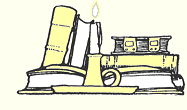
A friend found the following gem and brought it to my attention. It was composed by Charles Tart, who has this to say about it:
"In my workshops I often have people go through an experiential exercise
where I ask them to stand with their hands over their hearts, and recite
something I call "The Western Creed" as if it were a pledge of allegiance.
This is a perspective you'll find in almost any science book, and I wrote
it up as a deliberate parody of the Apostles' Creed.
"By and large, it depresses the hell out of people, especially when they
realize that they believe a lot of it, and that these beliefs are culturally
reinforced. I should say that I happen to love science – I'm a working
scientist. As Abraham Maslow said, science can be a marvelous opening-to-growth
system if you use it right; or it can be one of the best neurotic
defense mechanisms. Science seems to have degenerated into scientism, which
is a functioning religion for many people. This scientism has predominated in
our society for a while, and it's extremely depressing.
"Science functions as a revealed religion for most scientists. It's supposed
to be about constantly testing things, but typical scientists don't test 99.9%
of what they're told is scientific truth; they accept it on authority. Even
in their own fields, they probably never test the fundamentals. And I think
it's dangerous to create any religion unconsciously; that has psychologically
unhealthy effects on us; I think we should be aware of what we're doing."
The Western Creed© 1983 by Charles T. Tart
I believe in the material universe as the only and ultimate reality, a universe controlled by fixed physical laws and blind chance.
I affirm that the universe has no creator, no objective purpose, and no objective meaning or destiny.
I maintain that all ideas about God or gods, supernatural beings, prophets and saviors, or other nonphysical beings or forces are superstitions and delusions. Life and consciousness are totally identical to physical processes, and arose from chance interactions of blind physical forces. Like the rest of life, my life and consciousness have no objective purpose, meaning, or destiny.
I believe that all judgements, values, and moralities, whether my own or others', are subjective, arising solely from biological determinants, personal history, and chance. Free will is an illusion. Therefore, the most rational values I can personally live by must be based on the knowledge that for me what pleases me is Good, what pains me is Bad. Those who please me or help me avoid pain are my friends; those who pain me or keep me from my pleasures are my enemies. Rationality requires that friends and enemies be used in ways that maximize my pleasure and minimize my pain.
I affirm that churches have no real use other than social support; that there are no objective sins to commit or be forgiven for; that there is no retribution for sin or reward for virtue other than that which I can arrange, directly or through others. Virtue for me is getting what I want without being caught and punished by others.
I maintain that the death of the body is the death of the mind. There is no afterlife, and all hope for such is nonsense.
An elegant summary, I think, of a widespread philosophical position. Only I think it a bit unfair to call it "The Western Creed." It's really the materialist creed.
Return to Introduction to Essays
Return to Wind Off the Hilltop
Copyright © Earl Wajenberg, 2011